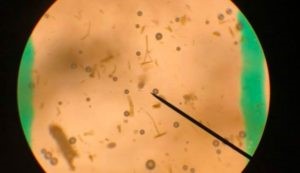Parasite resistance lab opens to assist sheep, goat producers
AgriLife Research opens fecal egg count lab to help with parasite resistance
June 19, 2020

Texas A&M AgriLife Research said it has opened the Fecal Egg Count Laboratory (FEC Lab) on June 15 to assist sheep and goat producers in making genetic selection decisions. The FEC Lab is housed at the Texas A&M AgriLife Research & Extension Center in San Angelo, Texas.
“We recognize that parasites are one of the most serious issues facing the Texas sheep and goat industry today, and we want to provide a service to help producers deal with this problem,” Jake Thorne, AgriLife Research sheep and goat associate, said.
The cost for evaluation is $5 per sample. Samples may be dropped off at the center during regular business hours or sent using an express mail or delivery service. Samples are analyzed within seven days of arrival.
Thorne said identifying animals that are more resistant to barber’s pole worm, through knowing their fecal egg counts, can help producers make better breeding decisions and reduce anthelmintic use.
“Combating parasites is a complex problem and requires a multifaceted approach to solve it,” Thorne said. “Being able to identify resistant animals, and keeping those as replacements, is a key component to helping producers successfully battle parasites.”
The FEC Lab website is still under development, but stakeholders wishing to submit samples before the official launch date of July 1 may email [email protected].
You May Also Like


